Characteristics and Correlation Analysis of the Psychological Status of 1035 Elderly People in the Place in Sichuan Province
-
摘要:
目的 通过对成都市某地老年人开展问卷调查,了解老年人心理状况,探索老年人不同心理状况之间的相关性,为相关部门早期建立老年人心理状况干预策略找准切入点。 方法 采用多阶段抽样方法,按照东、西、南、北、中确定抽样的社区,对社区在册老年人进行随机抽样,确定调查人群。2022年3月5日至2022年7月22日采用自制问卷量表对社区老年人开展现场调查,收集老年人基本信息、认知状况、抑郁状况、焦虑状况、精神病性症状等,等级资料采用秩和检验,等级资料相关性采用spearman相关分析,二分类资料采用卡方检验。 结果 不同性别老年人社会支持(Z = -2.348, P = 0.019)、焦虑(χ2 = 11.434, P = 0.001)、认知障碍(χ2 = 120.56 ,P < 0.001)差异具有统计学意义;不同婚姻状态老年人认知障碍( χ2 = 5.105, P = 0.024)差异具有统计学意义;不同职业类型老年人在社会支持(H = 14.512,P = 0.006)、抑郁(χ2 = 7.033, P = 0.008)、认知障碍(χ2 = 29.152, P < 0.001)差异具有统计学意义;不同文化程度老年人在社会支持( H = 12.019, P = 0.017)、认知障碍(χ2 = 56.752, P < 0.001)差异具体统计学差异。老年人在社会支持与抑郁( r =-0.079, P = 0.011)、社会支持与焦虑(r = -0.092,P = 0.003)、认知障碍与抑郁(r = 0.117,P < 0.001)、认知障碍与焦虑( r = 0.179,P < 0.001)、认知障碍与精神疾病症状( r = 0.188 P < 0.001)、抑郁与焦虑( r = 0.320 P < 0.001)、抑郁与精神疾病症状( r = 0.103,P = 0.001)、焦虑与精神疾病症状(r = 0.215 ,P < 0.001)等方面相关性显著。 结论 老年人不同人口学特征的心理状况存在差异较大,不同心理状况之间存在一定相关关系,相关部门应根据老年人口学不同特征制定心理状况综合干预策略,出现某一方面心理状况时,应开展与之相关的心理状况排查,才能早期有效改善老年人的心理状况,促进健康老龄化。 Abstract:Objective To understand the psychological status of the elderly, through a survey of the elderly in Chengdu, to explore the correlation between the different psychological status of the elderly, to find the cut-in point for the related departments to establish the intervention strategy of the psychological status of the elderly in the early stage. Methods By using a multi-stage sampling method, the sampled communities were selected according to the east, west, south, north, and central. From March 5, 2022 to July 22, 2022, a self-designed questionnaire was used to conduct a field survey among the elderly in the community, collected basic information, cognitive status, depression status, anxiety status, psychotic symptoms of the elderly, etc. chi-square test and rank sum test were used to analyze the differences of psychological status among the elderly with different demographic characteristics, and Spearman correlation analysis was used to analyze the correlation among the different psychological status of the elderly. Results It is based on the chi-square and rank sum test on the psychological status of the elderly with different demographic characteristics. There was statistically significant difference among the elderly in terms of social support (Z = -2.348, P = 0.019), anxiety (χ2 = 11.434, P = 0.001), and cognitive impairment (χ2 = 120.56 , P < 0.001). There was a statistically significant difference in cognitive impairment ( χ2 = 5.105, P = 0.024) among the elderly with different marital status. There were statistically significant differences in social support (H = 14.512 , P = 0.006), depression (χ2 = 7.033 , P = 0.008), and cognitive impairment (χ2 = 29.152, P < 0.001) among the elderly of different occupational types. There were statistically significant differences in social support ( H = 12.019, P = 0.017) and cognitive impairment (χ2 = 56.752, P < 0.001) among the elderly with different educational levels. There were significantly correlated with social support and depression ( r = -0.079, P = 0.011), social support and anxiety (r = -0.092, P = 0.003), cognitive impairment and depression (r = 0.117 , P < 0.001), and cognitive impairment and anxiety ( r = 0.179, P < 0.001), cognitive impairment and symptoms of mental illness ( r = 0.188 , P < 0.001), depression and anxiety ( r = 0.320 , P < 0.001), depression and symptoms of mental illness ( r = 0.103, P = 0.001), anxiety and symptoms of mental illness (r = 0.215, P < 0.001). Conclusions It is different in the psychological status of the elderly with different demographic characteristics, and there is a correlation between different psychological statuses. The relevant departments should formulate comprehensive intervention strategies according to the different demographic characteristics of the elderly, when a single mental state is found, it is necessary to carry out other related mental state investigations, which can effectively improve the mental state of the elderly and promote healthy aging. -
Key words:
- Epidemic Prevention and control /
- Elderly /
- Psychological status /
- Correlation analysis
-
动脉粥样硬化(atherosclerosis,AS)是一种以大动脉壁聚集脂质沉积物为主要特征的慢性炎症性疾病,其发病机理是一个复杂的级联反应,ox-LDL的形成和摄取是AS进展的关键步骤[1]。在氧化环境中,低密度脂蛋白(low density lipoprotein,LDL)被氧化修饰为氧化型LDL (oxidized low density lipoprotein,ox-LDL),ox-LDL会与内皮细胞以及单核细胞/巨噬细胞上的多种清道夫受体(scavenger receptors,SRs)结合,最终导致在狭窄的动脉粥样硬化动脉中形成富含血小板和白细胞的凝块[2]。
蛋白质髓样分化初级反应蛋白88 (myeloid differentiation primary response 88,MyD88)是一种重要的衔接分子,通过下调TLR-4/MyD88/P65表达,可减轻单核细胞趋化蛋白-1(monocyte chemoattractant protein-1,MCP-1)及TNF-α介导的内皮细胞凋亡和动脉粥样硬化进展[3-7]。因此,MyD88信号通路在AS发生发展过程中扮演着重要的调控作用。
AS已经成为威胁人类生命健康的主要疾病之一,目前临床仍缺乏有效的治疗药物[8]。虽然应用他汀类为代表的调血脂药取得了一定疗效,但其严重的不良反应限制了其发展。因此,从天然产物中寻找治疗AS的潜在药物具有重要意义。Corilagin是一种从Phyllanthus urinaria L.中分离的天然化合物,具有多种药理作用[9]。研究发现Corilagin在体内外均能抑制ox-LDL诱导的血管平滑肌细胞的增殖和迁移[10],还可降低ox-LDL诱导的HUVECs的LOX-1表达水平[11-12],提示其具有良好的抗AS作用。本研究将通过MyD88信号通路进一步探讨Corilagin干预对ox-LDL诱导损伤的HUVECs细胞的保护作用。
1. 材料与方法
1.1 研究材料
1.1.1 细胞
人脐静脉内皮细胞(HUVECs),购自中国典型物保藏中心。
1.1.2 药物
Corilagin由中科院昆明植物研究所提供,结构式见图1,分子量为634.46,纯度为99.5%,黄褐色粉状物,避光密封4℃保存。辛伐他汀原料药(Q12VK-FO),购自Sigma,分子式C25H38O5,分子量418.57,纯度 > 99%,防潮低温避光保存。维生素E (Vit E)原料药(T-438),购自Sigma,分子式为C29H50O2,分子量为430.71,纯度 > 99%,白色粉末,-20℃保存。
1.1.3 主要试剂
OX -LDL购自广州奕源生物科技有限公司,MTT-705B054购自Solarbio公司,BCA蛋白浓度测定试剂盒购自碧云天公司,TRNzol-A+总RNA提取试剂裂解液,Golden Taq PCR试剂盒,TIANScript M-MLV第一链cDNA合成试剂盒购自Fermentas公司,一抗β-actin购自SAB公司,MYD88(1∶1000),P65(1∶500),TNF-α(1:500),MCP-1(1∶1000)购自爱博泰克生物科技有限公司。
1.2 研究方法
1.2.1 药液配制
Corilagin药液:用PBS溶液配制成2 mmol/L的Corilagin母液。辛伐他汀药液:用PBS溶液配制成10000 µmol/L的辛伐他汀母液。维生素E药液:用PBS溶液配制成10000 µmol/L的维生素E母液。药液均临用前稀释成所需浓度。
1.2.2 细胞鉴定
(1)显微镜观察法:HUVECs的细胞形态于倒置相差显微镜下观察并拍照;(2)免疫组织化学法:将消毒灭菌后的0.5 cm×0.6 cm盖玻片放置在6孔培养板内,并将HUVECs浓度调整为1×105 个/mL,按2 mL/孔接种于6孔板内。培养至HUVECs 融合80%~90%后,取出盖玻片。检测HUVECs的VIII因子、CD34的表达,分别分为实验组和阴性对照组2组,每组设3个复孔,按照免疫组化流程处理后,于荧光显微镜下观察,并拍照保存。
1.2.3 MTT实验方法
将计数后的上述HUVECs接种于96孔板上,加入MTT(5 mg/mL)孵育4 h,再用三联液孵育8 h后,测定570 nm和630 nm处的OD值。
1.2.4 复制ox-LDL诱导HUVECs细胞损伤
用含EDTA的胰蛋白酶消化HUVECs,经细胞计数调整浓度为5×104个/mL,100 μL/孔接种到96孔板内,培养24 h。每次种板4块,分别用于探索HUVECs的损伤时间:6 h、12 h、24 h、48 h,实验重复3次。每块板设正常对照组和ox-LDL组。正常对照组:加入等量的PBS;ox-LDL组:分别加入终浓度为10 mg/L、20 mg/L、30 mg/L、40 mg/L、50 mg/L、60 mg/L、70 mg/L、80 mg/L的ox-LDL。应用改良MTT法测定不同损伤浓度及时间条件下ox-LDL对HUVECs的损伤程度,以确定ox-LDL损伤HUVEC的适宜浓度及时间。
1.2.5 Corilagin对ox-LDL诱导损伤的人脐静脉内皮细胞HUVECs保护作用观察
用含EDTA的胰蛋白酶消化HUVECs,经细胞计数调整浓度为5×104个/mL,并以100 μL/孔接种到96孔板内,培养24 h。每次种板6块,重复3次,每块板上设9个组:正常组;模型组;阳性药组:(Vit E:10 μmol/L、辛伐他汀:1 μmol/L);Corilagin给药组(3.125、6.25、12.5、25、50 μmol/L)。按照分组进行实验,根据改良MTT法测定细胞活力,评价Corilagin对ox-LDL损伤HUVECs的保护作用及其量-效/时-效关系。
1.2.6 RT-qPCR 检测ox-LDL损伤的HUVECs中MyD88、P65、TNF-α、MCP-1 mRNA的表达
将细胞分成正常组,模型组,阳性药组(Vit E:10 μmol/L、辛伐他汀:1 μmol/L);Corilagin组:Corilagin(3.125、6.25、12.5、25、50 μmol/L)一共9个组。孵育24 h,收集细胞提取总RNA进行RT-qPCR定量检测,引物序列见表1。
表 1 引物序列Table 1. Primer sequences基因名 引物序列 长度(bp) β-actin F-CGTGCGTGACATCAAAGAGA 178 R-CAAGAAGGAAGGCTGGAAAA MyD88 F-CTGGGGGCACTGTGGATT 174 R-CGCTGCTGGGGAGAAAAC P65 F-CAACCAAAACAGAGGGGATT 160 R-TTGTGACCAACTGAACGATA TNF-α F-CTCCTCACCCACACCGTC 226 R-AACACCCATTCCCTTCAC MCP-1 F-TGACCCCAAGAAGGAATG 180 R-GAGGTGGTTGTGGAAAAG 1.2.7 Western blot检测ox-LDL损伤的HUVECs及VSMCs中MyD88、P65、TNF-α、MCP-1蛋白的表达
实验分组同1.2.6,细胞培养24 h后,按照分组加入对应的药物浓度,孵育24 h,所有给药组给予70 mg/L的ox-LDL,刺激12 h,将各组细胞分别置于冰上充分研磨后提取总蛋白,总蛋白浓度用BCA蛋白检测试剂盒测定。蛋白质样品用12%、15%十二烷基硫酸钠-聚丙烯酰胺凝胶电泳分离,然后转移到聚偏二氟乙烯膜。用无蛋白快速封闭液封闭膜20 min。将PVDF膜与一抗在4℃孵育过夜,用TBST洗涤3次后与二抗孵育2 h。TBST洗涤3次,用Bio-Rad凝胶成像系统显影、收集和分析靶蛋白的图像,采用ImageJ软件统计数据。
1.3 统计学处理
实验数据采用“均值±标准差(
$\bar x \pm s $ )”表示,并使用SPSS软件进行统计学分析。多组数据间的比较使用One-way ANOVA单因素方差分析法。方差齐时,使用LSD法进行组间两两比较,P < 0.05时各组间差异具有统计学意义。2. 结果
2.1 HUVECs的鉴定
2.1.1 形态学鉴定
倒置显微镜下显示,HUVECs细胞呈扁平的卵圆形、梭形、多角形,细胞均匀透亮,边界清晰,胞核清晰,呈圆形或椭圆形,有2~3个核仁。胞浆内含小颗粒,结构完整,符合血管内皮细胞的基本形态,见图2A~2B。
2.1.2 免疫学鉴定
内皮细胞的特异性蛋白CD34、Ⅷ因子既是胞浆蛋白也是胞膜蛋白。通过免疫化学鉴定结果表明,阴性对照细胞形态完整,背景清晰均匀,而阳性组细胞边界清晰,呈棕红色,胞浆和胞膜边缘颜色更深,细胞核明显,见图3A。HUVEC Ⅷ因子的阳性表达,见图3B;CD34阳性表达,进一步证实培养的细胞为HUVECs,见图3D。
2.2 OX-LDL刺激HUVECs损伤模型
寻找最佳的ox-LDL刺激HUVECs损伤模型的条件。结果显示,随着ox-LDL浓度的增加,OD值下降,说明ox-LDL对HUVECs具有损伤作用。与正常对照组比较,刺激6 h,70 mg/L和80 mg/L浓度的ox-LDL明显损伤了HUVECs(P < 0.01);刺激12、24、48 h,60~80 mg/L浓度的ox-LDL明显损伤HUVECs(P < 0.01)。因此,笔者最终选取终浓度为70 mg/L的ox-LDL刺激HUVECs 12 h作为复制ox-LDL损伤HUVECs模型的最佳条件,见图4。
2.3 Corilagin对ox-LDL损伤HUVECs的保护作用
与正常对照组比较,ox-LDL损伤模型组的细胞活力明显降低(P < 0.01);与模型比较,孵育12 h,6.25~50 μmol/L的Corilagin处理组的细胞活力明显提高,25 μmol/L的Corilagin保护作用最明显,细胞活力较模型组提高50%,50 μmol/L的Corilagin组细胞活力与25 μmol/L组基本持平(P < 0.01);孵育24 h,3.125~50 μmol/L的Corilagin处理组的细胞活力明显提高,25 μmol/L的Corilagin组细胞活力最高,接近正常组水平(P < 0.01);孵育48 h,仅25 μmol/L和50 μmol/L的Corilagin处理组的细胞活力明显提高,较模型组提高30%(P < 0.01),见图5。这表明,Corilagin能对ox-LDL损伤的HUVECs具有保护作用,其中以25 μmol/L和50 μmol/L的浓度效果最显著。
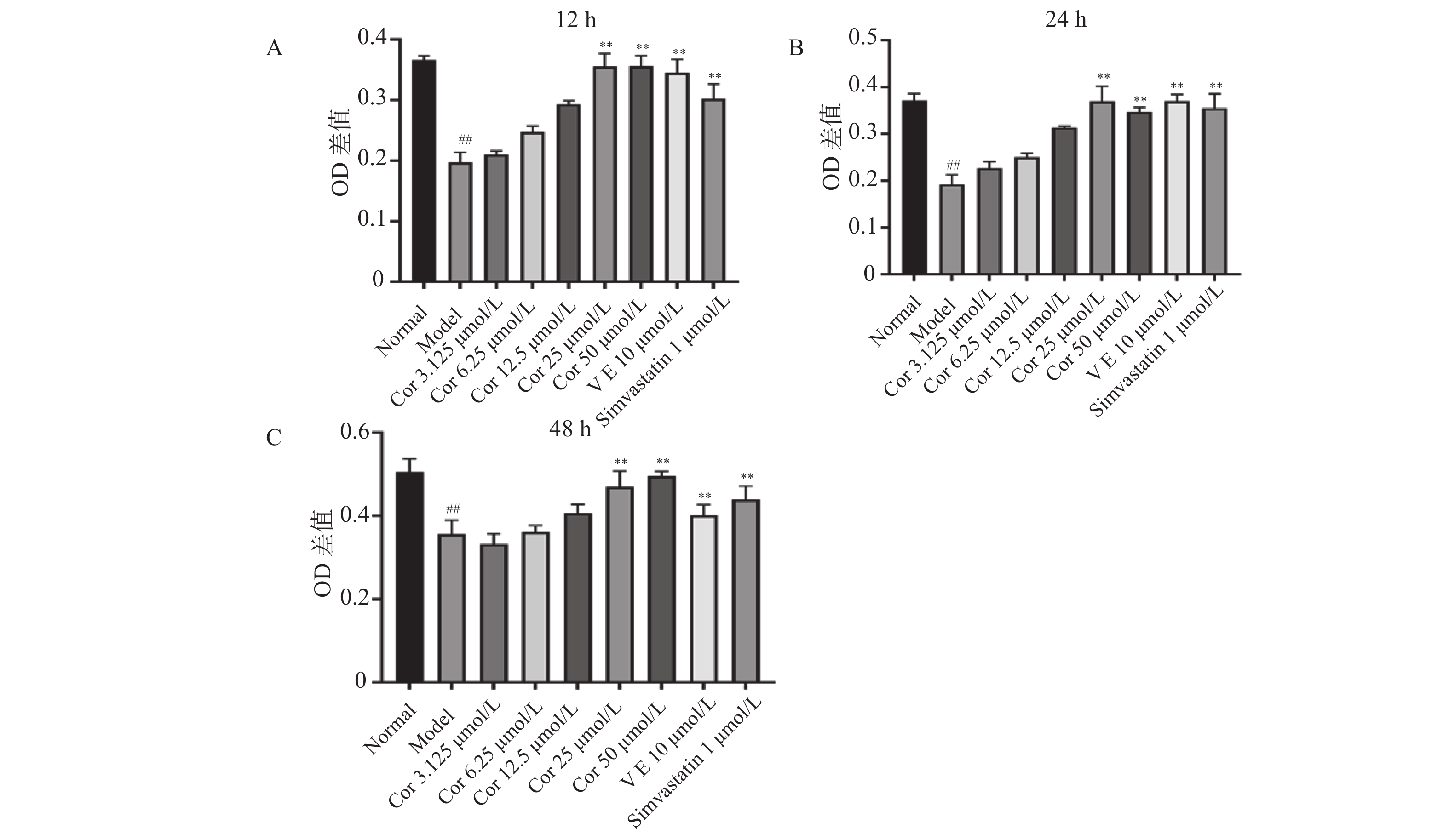 图 5 Corilagin对OX-LDL损伤HUVECs的保护作用(
图 5 Corilagin对OX-LDL损伤HUVECs的保护作用($\bar x \pm s $ ,n = 6)A:Corilagin对OX-LDL损伤HUVECs作用12 h对细胞活力的影响;B:Corilagin对OX-LDL损伤HUVECs作用24 h对细胞活力的影响;C:Corilagin对OX-LDL损伤HUVECs作用48 h对细胞活力的影响。与正常组相比,##P < 0.01,与模型组相比,**P < 0.01。Figure 5. Protective effect of Corilagin on OX-LDL-damaged HUVECs ($\bar x \pm s $ ,n = 6)2.4 Corilagin对ox-LDL损伤HUVECs中MyD88、P65、TNF-α、MCP-1 mRNA表达的影响
与正常对照组比较,ox-LDL模型组的MyD88、NF-kB、TNF-α、MCP-1mRNA的表达量显著升高(P < 0.01)。与ox-LDL模型组比较,不同浓度Corilagin(12.5 μmol/L、25 μmol/L、50 μmol/L)组和阳性药组(辛伐他汀、维生素E)的MyD88、P65、MCP-1、TNF-α mRNA的表达量均显著降低(P < 0.05),见图6。以上结果表明,Corilagin可抑制ox-LDL诱导HUVECs的HUVECs损伤中的MyD88、P65、TNF-α、MCP-1的mRNA表达。
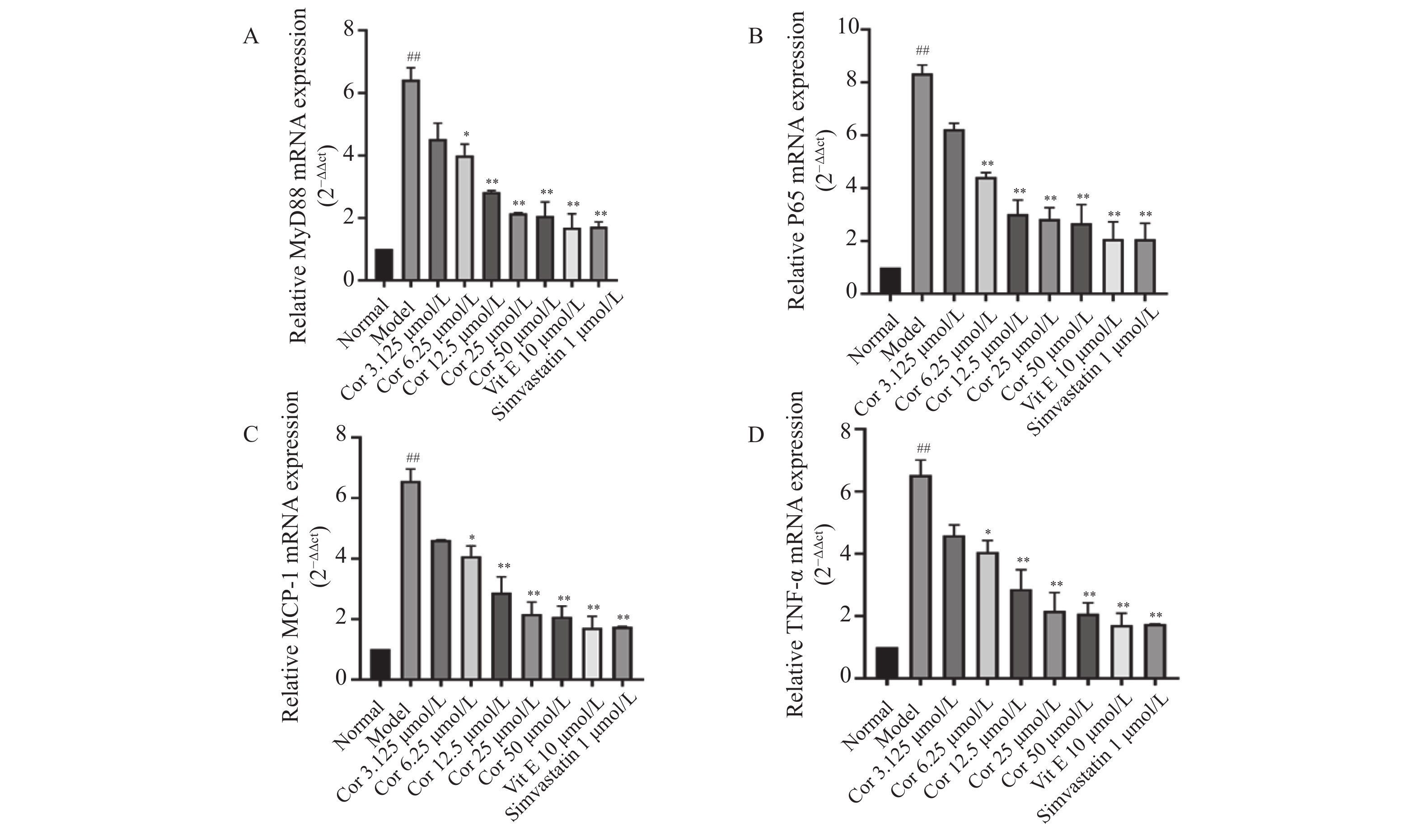 图 6 Corilagin对OX-LDL诱导的HUVECs中P65、MCP-1、MyD88和TNF-α的mRNA表达的影响(
图 6 Corilagin对OX-LDL诱导的HUVECs中P65、MCP-1、MyD88和TNF-α的mRNA表达的影响($\bar x \pm s $ ,n = 6)A:不同浓度Corilagin对OX-LDL诱导的HUVECs中MYD88 mRNA表达的影响;B:不同浓度Corilagin对OX-LDL诱导的HUVECs中P65 mRNA表达的影响;C:不同浓度Corilagin对OX-LDL诱导的HUVECs中MCP-1mRNA表达的影响;D:不同浓度Corilagin对OX-LDL诱导的HUVECs中TNF-αmRNA表达的影响。与正常组相比,##P < 0.01,与模型组相比,*P < 0.05,**P < 0.01。Figure 6. Effect of Corilagin on mRNA expression of P65,MCP-1,MyD88 and TNF-α in OX-LDL-induced HUVECs($\bar x \pm s $ ,n = 6)2.5 Corilagin对ox-LDL损伤HUVECs中MyD88、P65、TNF-α、MCP-1蛋白表达的影响
与正常对照组比较,ox-LDL模型组MyD88、P65、TNF-α、MCP-1蛋白表达均显著升高(P < 0.01)。与模型组比较,Vit E 10 μmol/L、辛伐他汀1 μmol/L组和不同浓度Corilagin(12.5 μmol/L、25 μmol/L、50 μmol/L)组MyD88、P65、TNF-α、MCP-1蛋白表达均出现显著降低(P < 0.05),见图7。以上结果显示,Corilagin可抑制ox-LDL损伤的HUVECs中MyD88、P65、TNF-α、MCP-1蛋白表达。
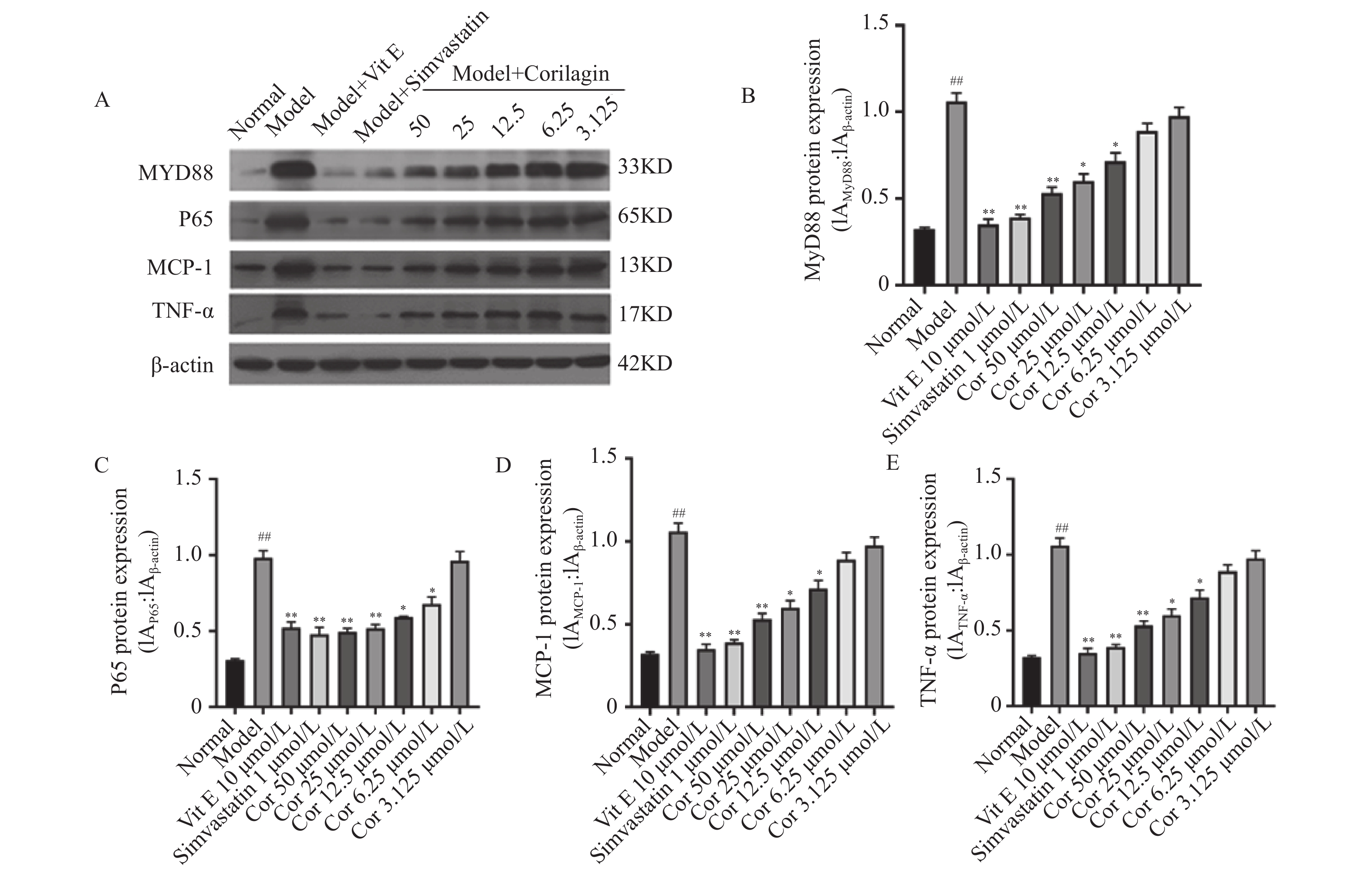 图 7 Corilagin对OX-LDL诱导的HUVECs中P65、MCP-1、MyD88和TNF-α的蛋白表达的影响(
图 7 Corilagin对OX-LDL诱导的HUVECs中P65、MCP-1、MyD88和TNF-α的蛋白表达的影响($\bar x \pm s $ ,n = 3)A:Western blot 检测Corilagin对OX-LDL诱导的HUVECs中P65、MCP-1、MyD88和TNF-α的蛋白表达的影响;B:Corilagin对OX-LDL诱导的HUVECs中MYD88蛋白表达的影响;C:Corilagin对OX-LDL诱导的HUVECs中P65蛋白表达的影响;D:Corilagin对OX-LDL诱导的HUVECs中MCP-1蛋白表达的影响;E:Corilagin对OX-LDL诱导的HUVECs中TNF-α蛋白表达的影响。与正常组相比,##P < 0.01;与模型组相比,*P < 0.05,**P < 0.01。Figure 7. Effect of Corilagin on protein expression of P65,MCP-1,MyD88 and TNF-α in OX-LDL-induced HUVECs ($\bar x \pm s $ ,n = 3)3. 讨论
AS病程复杂,涉及脂质代谢紊乱和免疫细胞向动脉壁募集等病理过程。他汀类药物是治疗血脂异常的一线药物,具有降低LDL-C的功效,然而,部分人对他汀类药物不耐受,且不良反应较多,限制其使用[13],因此,寻找安全有效的抗AS药物是医药学界急需解决的问题。
血管内皮细胞是参与AS发生发展的关键细胞之一,研究选用HUVECs细胞系,通过鉴定发现该细胞符合血管内皮细胞的形态特征并且高表达血管内皮细胞特异性蛋白CD34和Ⅷ,提示该细胞系确为HUVECs。目前普遍认为血管内皮细胞的氧化损伤是AS发展的始动环节,采用ox-LDL诱导后笔者发现60~80 mg/L浓度的ox-LDL 作用12 h可使HUVECs损伤明显,因此本研究选择75 mg/L浓度的ox-LDL 作用12 h为造模条件。在前期研究中笔者已经发现了Corilagin抗AS的作用,本实验中进一步在细胞水平评价了不同时-效/量-效的Corilagin对ox-LDL损伤HUVECs的保护作用,结果显示,Corilagin在12、24、48 h以浓度依赖的方式(3.125、6.25、12.5、25、50 μmol/L)提高细胞活力,表明Corilagin对ox-LDL损伤HUVECs具有保护作用。
炎性反应贯穿AS发生发展的全过程,MyD88是TLR信号转导通路的关键靶标,在炎症反应中发挥着重要作用,它通过调控胞浆募集下游的肿瘤坏死因子受体相关因子-6(tumor-necrosis factor receptor associated factor,TRAF-6),诱导TNF-α和MCP-1等炎症因子的表达。Zhu等[14]研究发现抑制巨噬细胞中TLR4/MyD88/P65信号通路后小鼠AS出现转归,表明以MyD88衔接的炎症反应通路对AS的进展具有重要调控作用。HUVECs作为研究内皮细胞功能调节的模型系统,常应用于血管形成、AS斑块的研究[15]。本研究以MyD88、P65、TNF-α和MCP-1为研究靶标,通过RT-qPCR 和Western blot 技术检测Corilagin对ox-LDL诱导的损伤HUVECs模型中上述因子的表达的影响,在模型组中,MyD88、P65、TNF-α和MCP-1的表达均明显上调,而Corilagin组中这些指标的表达均得到了显著逆转。
综上所述,Corilagin对ox-LDL损伤的HUVECs的保护作用可能是通过下调MyD88基因的表达,抑制p65、炎性因子TNF-α和趋化因子MCP-1的表达来实现的。本研究没有采用MyD88抑制剂佐证Corilagin通过下调MyD88信号通路发挥抗AS作用,因此,在接下来的研究中,笔者将使用MyD88抑制剂在动物-细胞水平进一步验证Corilagin的作用机制,为Corilagin临床用于防治AS 提供理论和实验依据。
-
表 1 不同人口学特征老年人心理状况比较[n(%)]
Table 1. The comparison of psychological status of the elderly with different demographic characteristics [n(%)]
分类 社会支持 抑郁 焦虑 精神疾病症状 认知障碍 差 中 强 有 无 有 无 有 无 有 无 性别 男 11(2.4) 187(40.7) 262(56.9) 9(2.0) 451(98.0) 72(15.7) 388(84.3) 133(28.9) 327(71.1) 121(26.3) 339(73.7) 女 16(2.8) 188(32.7) 371(64.5) 17(3.0) 558(97.0) 139(24.2) 436(75.8) 195(33.9) 380(65.1) 17(3.0) 558(97.0) χ2/Z −2.348 1.044 11.434 2.951 120.556 P 0.019* 0.307 0.001* 0.086 < 0.001* 婚姻状态 已婚 18(2.1) 321(37.1) 527(60.9) 20(2.3) 846(97.7) 172(19.9) 694(80.1) 45(5.2) 821(94.8) 238(27.5) 628(72.5) 单身 9(5.3) 54(32.0) 106(62.7) 6(3.6) 163(96.4) 39(23.1) 130(76.9) 11(6.5) 158(93.5) 61(36.1) 108(63.9) χ2/Z −0.135 0.455 0.901 2.464 5.105 P 0.893 0.5 0.343 0.117 0.024* 职业类型 农民 6(1.5) 122(30.3) 268(67.8) 16(4.0) 380(96.0) 80(20.2) 316(79.8) 131(33.1) 265(66.9) 150(37.9) 246(62.1) 工人 11(3.6) 126(41.6) 166(54.8) 7(2.3) 296(97.7) 54(17.8) 249(82.2) 80(26.4) 223(73.6) 81(26.7) 222(63.3) 干部 7(3.8) 65(35.3) 112(60.9) 2(1.1) 182(98.9) 40(21.7) 144(78.3) 54(29.4) 130(70.7) 33(17.9) 151(82.1) 商人 0(0) 9(36.0) 16(64.0) 1(4.0) 24(96.0) 4(16.0) 21(84.0) 6(24.0) 19(76.0) 5(20.0) 20(80.0) 其他 3(2.4) 53(41.7) 71(55.9) 0(0) 127(100.0) 33(26.0) 94(74.0) 56(44.1) 71(55.9) 31(24.4) 96(75.6) χ2/H 14.512 7.033 4.192 14.462 29.152 P 0.006* 0.008* 0.381 0.06 < 0.001* 文化程度 文盲 3(2.9) 32(30.5) 70(66.7) 3(2.9) 102(96.1) 30(28.6) 75(71.4) 43(41.0) 62(59.0) 37(35.2) 68(64.8) 小学 8(2.2) 126(34.1) 236(63.7) 14(3.8) 356(96.2) 72(19.5) 298(80.5) 121(32.7) 249(67.3) 136(36.8) 234(63.2) 初中 8(2.7) 100(33.7) 189(63.4) 5(1.7) 292(98.3) 61(20.5) 236(79.5) 90(30.3) 207(69.7) 63(21.2) 234(78.8) 高中 7(3.9) 81(45.3) 91(50.8) 3(1.7) 176(98.3) 32(17.9) 147(82.1) 53(29.6) 126(70.4) 22(12.3) 157(87.7) 大专及以上 1(1.2) 36(42.9) 47(55.9) 1(1.2) 83(98.8) 16(19.0) 68(81.0) 21(25.0) 63(75.0) 10(11.9) 74(88.1) χ2/H 12.019 2.725 5.321 6.695 56.752 P 0.017* 0.099 0.256 0.153 < 0.001* *P < 0.05。 表 2 老年人不同心理状况之间的spearman相关分析
Table 2. The spearman correlation analysis of different mental status in the elderly
项目 分组 社会支持 认知障碍 抑郁 焦虑 精神疾病症状 社会支持 相关系数 1.000 −0.033 −0.079 −0.092 −0.040 Sig.(双尾) 0.296 0.011* 0.003* 0.196 认知障碍 相关系数 −0.033 1.000 0.117 0.179 0.188 Sig.(双尾) 0.296 < 0.001** < 0.001** < 0.001** 抑郁 相关系数 −0.079 0.117 1.000 0.320 0.103 Sig.(双尾) 0.011* < 0.001** < 0.001** 0.001** 焦虑 相关系数 −0.092 0.179 0.320 1.000 0.215 Sig.(双尾) 0.003* < 0.001** < 0.001** < 0.001** 精神疾病症状 相关系数 −0.040 0.188 0.103 0.215 1.000 Sig.(双尾) 0.196 < 0.001** 0.001** < 0.001** *P < 0.05, **P < 0.001。 -
[1] 梅斯医学. 如何结束全球新冠疫情?Nature最新: 来自112个国家和地区的386名专家达成共识[EB/OL]. (2022-11-13)[2023-06-23]. https://new.qq.com/rain/a/20221113AOOS1P00. [2] 新浪美股, 新冠疫情或给全球经济造成82万亿美元损失[EB/OL]. (2020-05-21)[2022-11-13]. https://tech.sina.com.cn/roll/2020-05-21/doc-iircuyvi4193206.shtml. [3] 胡芳芳,赵燕,李梦华,等. 新型冠状病毒肺炎长期后遗症负面影响及对策建议[J]. 中国公共卫生,2022,38(9):1229-1232. [4] 鲁杨,陈琳,顾吉娜,等. “长新冠”综合征的研究进展[J]. 中华医院感染学杂志,2022,32(16):2556-2560. [5] Liu M,Zhao X,Liu Z. Relationship between psychological distress,Basic psychological needs,Anxiety,Mental Pressure,and athletic burnout of chinese college football athletes during the COVID-19 pandemic[J]. Sustainability,2022,14(12):1-13. [6] 李湘君,王中华. 社会关系类型与空巢老人认知功能的关系研究[J]. 现代预防医学,2023,50(5):848-853. [7] 罗微,程鹏. 空巢老人社会参与状况对其健康状况的影响[J]. 医学与社会,2023,36(4):37-42. [8] 郭慧峰,潘锋丰,耿慧,等. 平均动脉压与高龄老人认知功能减退的相关性[J]. 中国老年学杂志,2019,36(3):526-529. doi: 10.3969/j.issn.1005-9202.2019.03.005 [9] 张红. 中文版GDS-15和PHQ-9在老年人抑郁评估中的适用性分析[D]. 济南: 山东大学, 2020. [10] 周滢. 老年轻度认知障碍患者情绪问题多模态特征融合分类模型的构建与评价研究[D]. 北京: 北京协和医学院, 2022. [11] 张瑞雪. 社区慢性病老年人社会支持、慢性病自我效能和幸福感的相关性研究[D]. 辽宁: 锦州医科大学, 2017. [12] 陈涛. 老年人认知衰弱的年龄与性别差异研究[D]. 济南: 山东大学, 2021. [13] 魏蒙,王红漫. 中国老年人失能轨迹的性别,城乡及队列差异[J]. 人口与发展,2017,23(5):74-81,98. doi: 10.3969/j.issn.1674-1668.2017.05.008 [14] 刘堃,翟向明,刘丽萍,等. 老龄化背景下社区老年人健康教育需求[J]. 中国老年学杂志,2021,41(4):861-864. doi: 10.3969/j.issn.1005-9202.2021.04.056 [15] Ebimgbo S O,Chukwu N E,Okoye UO. Gender differences in family support to older adults and implications for social work in south-east Nigeria[J]. Journal of Aging Studies,2021,59(1):100979. [16] Lin H,Xiao S,Shi L,et al. Impact of multimorbidity on symptoms of depression,anxiety,and stress in older adults: is there a sex difference?[J]. Frontiers in Psychology,2021,12(1):1-8. [17] Furuto-Kato S,Araki A,Chiba Y,et al. Relationship between the thyroid function and cognitive impairment in the elderly in Japan[J]. Internal Medicine (Tokyo,Japan),2022,61(1):3029-3036. [18] 颜娉婷,刘丹,程桂荣,等. 老年人婚姻状况与轻度认知障碍及痴呆相关性的横断面研究[J]. 中山大学学报(医学科学版),2022,43(2):229-237. [19] 王一卉. 社会支持和社会参与对我国老年人认知功能障碍发生风险的影响[D]. 兰州: 兰州大学, 2021. [20] 杨学琴. 社区居民抑郁状态及早期干预有效性研究[D]. 北京: 北京中医药大学, 2012. [21] 苟梦琪,孙海清,杨源瑞,等. 老年高血压脑卒中患者认知障碍的危险因素分析[J]. 老年医学与保健,2021,27(5):982-986. doi: 10.3969/j.issn.1008-8296.2021.05.022 [22] 刘艾红,彭颖洁,朱文莉,等. 社会支持、抑郁对社区老年人衰弱的影响分析[J]. 中华现代护理杂志,2022,28(20):2690-2693. doi: 10.3760/cma.j.cn115682-20210727-03326 [23] 景璐石,冯景蕙,陈贤清,等. 农村丧偶老年人抑郁状况与社会支持、应对方式的相关性[J]. 中国老年学杂志,2021,41(11):2414-2416. doi: 10.3969/j.issn.1005-9202.2021.11.050 [24] 金雅茹. 社区老年人衰弱与抑郁: 社会支持的中介及调节作用[D]. 济南: 山东大学, 2019. [25] 徐澳,王伟炳,朱丹红,等. COVID-19疫情下上海市社区居民社会支持、焦虑及睡眠质量关系研究[J]. 中华疾病控制杂志,2022,26(2):188-192,217. [26] 王莉,吴松起,施雁,等. 居家老年痴呆患者家庭照顾者焦虑抑郁与社会支持状况的相关性分析[J]. 中华现代护理杂志,2022,28(17):2289-2295. doi: 10.3760/cma.j.cn115682-20210929-04445 [27] 王锦秀,王剑涛,胡月,等. 抑郁和焦虑与老年认知障碍患者认知水平的相关性分析[J]. 中国临床医学,2022,29(4):536-543. [28] 李庆. 疾病对老年人认知功能的影响[J]. 医学理论与实践,2011,24(1):116-117. doi: 10.3969/j.issn.1001-7585.2011.01.091 [29] 秦立伟,罗艳艳,常红娟,等. 社区老年人孤独感、抑郁与自我感知老化的关系研究[J]. 中国社会医学杂志,2022,39(4):445-449. [30] 位彦鸽. 重性精神疾病患者抑郁症状与局部功能连接、血浆瘦素水平的相关性研究[D]. 沈阳: 中国医科大学, 2018. [31] Nagoor K,Darivemula S B,Reddy N B,et al. Prevalence of mental illness and their association with sociodemographic factors in the rural geriatric population in chittoor,andhra pradesh,India: a community-based study[J]. Journal of Education and EealthPromotion,2018,7(1):1-7. [32] 周倩华. 新冠肺炎疫情期间老年病科住院患者临床特点分析[D]. 唐山: 华北理工大学, 2021. [33] 黄斌英,张婷婷,邹国娟,等. 新型冠状病毒肺炎疫情下老年人的心理状态调查和防控分析[J]. 全科护理,2020,18(8):935-937. [34] Dhakal U,Koumoutzis A,Vivoda J M. Better together: Social contact and loneliness among U. S. older adults during COVID-19[J]. J Gerontol B Psychol Sci Soc Sci,2023,78(2):359-369. doi: 10.1093/geronb/gbac136 [35] Yang H,Hu J. Loneliness or abandonment: The adaptability of the elderly in elderly care institution during Anti-COVID-19 epidemic[J]. Chinese Journal of International review,2022,4(1):1-28. -






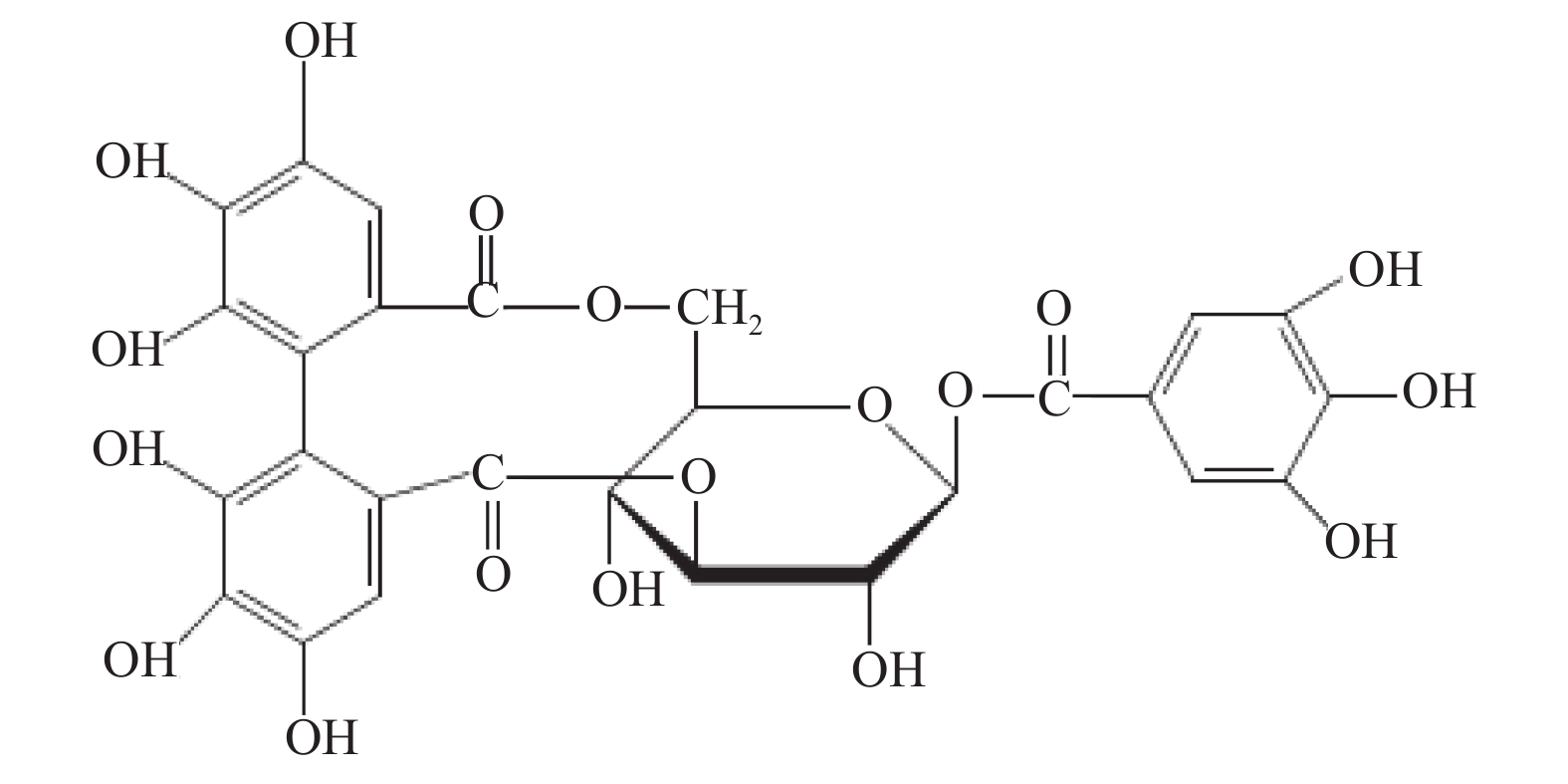
 下载:
下载:


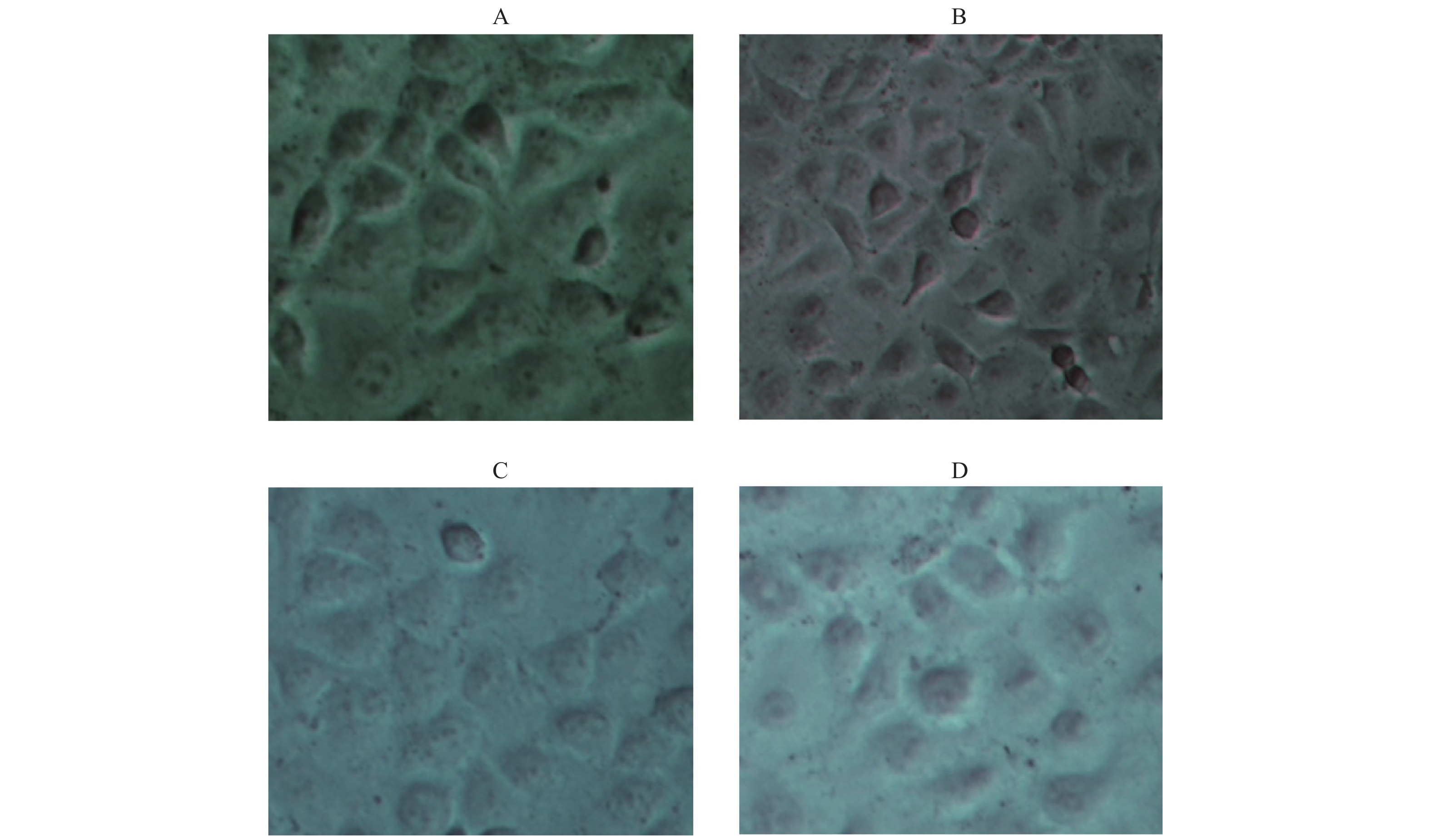
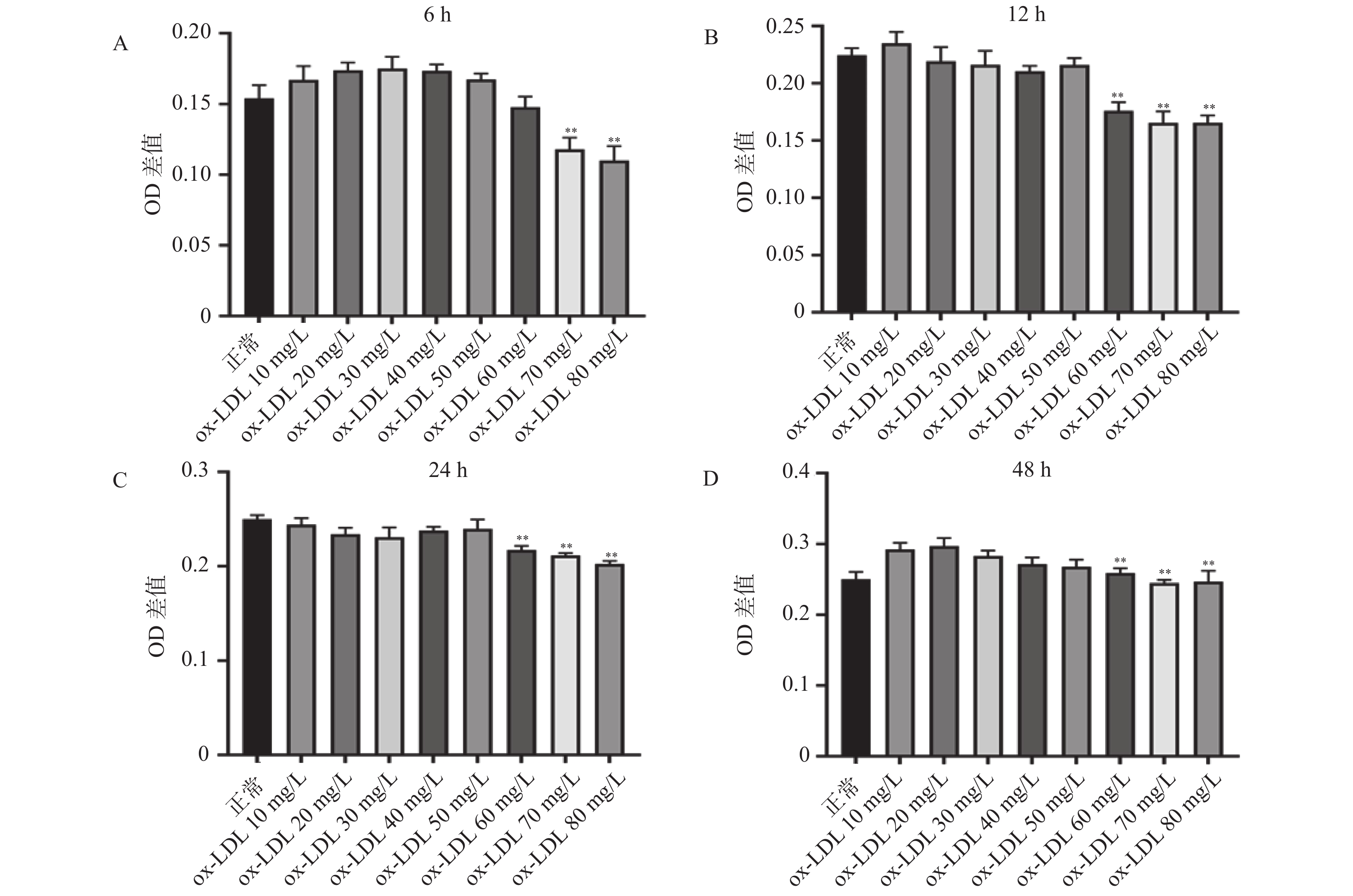








 下载:
下载: 
